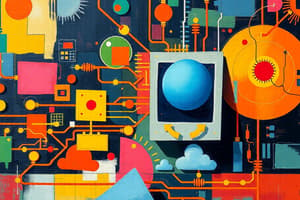Podcast
Questions and Answers
What is the primary purpose of information security and governance policies?
What is the primary purpose of information security and governance policies?
- To enable seamless communication and entertainment in everyday life
- To protect sensitive information and ensure compliance with regulations (correct)
- To streamline business processes and increase productivity
- To provide access to educational resources and enable remote learning
How do businesses benefit from the use of ICT?
How do businesses benefit from the use of ICT?
- Enhanced access to educational resources and collaborative learning
- Increased efficiency and new opportunities for growth (correct)
- Improved privacy and reduced cybersecurity threats
- Simplified everyday tasks and increased accessibility to services
What is the role of ICT in the educational sector?
What is the role of ICT in the educational sector?
- Addressing cybersecurity threats and privacy issues
- Streamlining business processes and increasing productivity
- Enabling seamless communication and entertainment in everyday life
- Providing access to a wealth of information and enabling remote learning (correct)
Which of the following is not a common challenge or concern associated with the use of ICT?
Which of the following is not a common challenge or concern associated with the use of ICT?
How has ICT impacted everyday life for individuals?
How has ICT impacted everyday life for individuals?
What is the primary focus of information and communication technology (ICT) in the modern world?
What is the primary focus of information and communication technology (ICT) in the modern world?
What is the primary function of Information and Communication Technologies (ICT)?
What is the primary function of Information and Communication Technologies (ICT)?
Which of the following is NOT a component of ICT?
Which of the following is NOT a component of ICT?
What is the role of middleware in ICT?
What is the role of middleware in ICT?
Which of the following is NOT an example of a communication technology in ICT?
Which of the following is NOT an example of a communication technology in ICT?
What is the role of the cloud in ICT?
What is the role of the cloud in ICT?
Which of the following is an example of a device in ICT?
Which of the following is an example of a device in ICT?
Study Notes
Information and Communication Technologies (ICT): Overview and Benefits
Information and Communication Technologies (ICT) are a combination of devices, networking components, software, middleware, data, wired and wireless networks, and communication technologies that facilitate the creation, processing, and sharing of data and information worldwide. These technologies are essential in enabling modern computing and providing various communication and connectivity options to users. Let's explore the role of ICT, its components, and the benefits it offers across various sectors such as businesses, education, and everyday life.
Components of ICT
The components of ICT are diverse and ever-evolving. They include:
- Devices: Hardware such as computers, smartphones, tablets, and wearables.
- Software: Operating systems, applications, and programming languages.
- Middleware: Systems that enable different devices and software to communicate with each other.
- Data: Stored and processed information, often collected, analyzed, and shared through ICT.
- Networks: Both wired and wireless connections that enable communication between devices and systems.
- Communication technologies: Tools like email, social media, video conferencing, and instant messaging.
- The cloud: Remote storage and processing of data and applications through online services.
- Information security and governance policies: Frameworks to protect sensitive information and ensure compliance with regulations.
Benefits of ICT
ict provides numerous benefits across various sectors, including:
Businesses
In the business world, ICT offers cost savings, increased efficiency, and new opportunities for growth. With automation, businesses can streamline their processes, reduce manual labor, and increase productivity. The big data revolution allows organizations to analyze vast amounts of data and gain insights, which can lead to improved products, services, and decision-making. Additionally, e-commerce platforms and digital transactions have expanded customer choices and convenience.
Education
ICT has transformed the educational landscape by providing access to a wealth of information, enabling remote learning, and facilitating collaborative education. Students can now access a wide range of resources from anywhere in the world, allowing them to learn at their own pace. ICT also supports creative learning environments where students can explore multimedia content, engage in interactive activities, and develop critical thinking skills. Collaborative tools such as teleconferencing classrooms allow educators and students to connect globally, fostering international understanding and cooperation.
Everyday Life
For individuals, ICT plays an essential role in daily life. It enables seamless communication through tools like email, social media, and instant messaging apps. ICT also powers entertainment platforms, such as streaming services, gaming consoles, and virtual reality experiences, providing immersive and engaging forms of leisure. Furthermore, healthcare applications, online shopping, and mobile banking are just some examples of how ICT has simplified everyday tasks and made them more accessible to people worldwide.
Challenges and Concerns
Despite its many benefits, ICT also presents challenges and concerns. Cybersecurity threats, privacy issues, and the digital divide are some of the challenges that society must address as we continue to rely on these technologies. Additionally, there is a need for education and training programs to ensure that individuals have the necessary skills to fully leverage ICT and participate in an increasingly digitized world.
In conclusion, Information and Communication Technologies (ICT) play a vital role in modern life, shaping our businesses, educational systems, and personal experiences. As technology continues to evolve, it will be essential for us to adapt and embrace new innovations while addressing the challenges they present. By doing so, we can unlock the full potential of ICT and create a more connected and technologically advanced future.
Studying That Suits You
Use AI to generate personalized quizzes and flashcards to suit your learning preferences.
Description
Explore the components, benefits, and challenges of Information and Communication Technologies (ICT) in the modern digital landscape. Learn about the diverse elements of ICT, its role in transforming businesses, education, and daily life, and the potential concerns and obstacles associated with these technologies.




